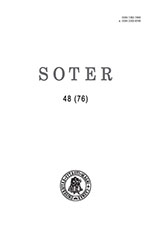Pagalbos poreikis moterims krizinio nėštumo metu: retrospektyvus tyrimas
Retrospective study of a demand for counseling for women in crisis pregnancy
Author(s): Aušrelė Krunglevičiūtė, Birutė ObelenienėSubject(s): Christian Theology and Religion
Published by: Vytauto Didžiojo Universitetas
Keywords: Crisis pregnancy; abortion; demand of help for woman
Summary/Abstract: Krizinis nėštumas – Lietuvoje mažai tyrinėta problema. Trūksta tyrimų, kurie atskleistų moterų, išgyvenančių nėštumo krizę, pagalbos poreikį ir jos pobūdį. Kokybiniu tyrimu atskleidžiamas moterų, patiriančių krizinį nėštumą, pagalbos poreikis. Krizinio nėštumo metu moterys būtų norėjusios: psichologinės pagalbos, galimybės aptarti sprendimą su gydytojais, objektyvios informacijos apie abortą ir žmogaus gyvybės pradžią, aborto neskatinimo ir paskatinimo motinystei. Situaciją galėjo pakeisti problemos sprendimo paieška, vaiko gimimui palanki žinia, autoritetingas patarimas ir gydytojų informacija apie abortą. Didelę įtaką apsisprendžiant turi stiprus emocinis ryšys, pasitikėjimas patariančiu žmogumi. In Lithuania crisis pregnancy is a problem that still lacks research. There is a lack of studies that would show the demand and the nature of help required by women who go through crisis pregnancy. Crisis pregnancy is a prennancy which is neither planned nor desired by woman, and which means a personai crisis for her. This defition can include a woman for whom a planned or desired pregnancy turns into a crisis over time due to a change in circumstances. Support of close friends or family members is one of the most important factors for woman in crisis pregnancy that could help to overcome it. Qualitative research shows the demand for help that women experiencing crisis pregnancy need. The re¬search method is semi-structured personal interview. Women who had an abortion and received pastoral help through Rachelle program participated in this research. During the time of deliberation the emotional state of women could be described as discomfort (fear), feeling of being lost (having no one to share with or having a strong inner resistance) and being forced to choose an abortion instead of being ofered help. The reaction to a crisis pregnancy from medical doctors was pressure, indifference or lack of informa-tion. The reaction of husbands/partners to a crisis pregnancy was incomprehension of the situation, hostility towards an unborn child, psychological pressure and even abuse. The reaction from relatives and those close to a pregnant woman was a lack of dialogue, showing no interest towards an unborn child, encouraging an abortion or dissuading it. In a case of encouraging an abortion or dissuading it woman's decision to give birth depended on the strength of the emotional bond with and trust in the person giving the advice. According to this research women would have needed psychological help, a chance to discuss their choice with medical doctors, objective information about abortion and the beginning of human life, to be discour-aged to choose an abortion and motivated for the motherhood. The search for solution, as well as positive news of child birth, an authoritative advice and the truth about abortion told by a medical doctor could have changed their decision.
Journal: SOTER: religijos mokslo žurnalas
- Issue Year: 76/2013
- Issue No: 48
- Page Range: 115-128
- Page Count: 14
- Language: Lithuanian

